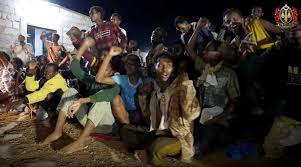HUMAN trafficking, a modern form of slavery, remains one of the most severe human rights violations in Africa today. This multi-billion-dollar global industry preys on the vulnerable, exploiting them for forced labour, sexual exploitation, and other forms of abuse. According to the United Nations Office on Drugs and Crime (UNODC), women and girls account for the majority of trafficking victims, with sexual exploitation being the most common form. The crisis is particularly dire in Nigeria, where poverty, unemployment, insecurity, and weak law enforcement create fertile ground for traffickers to operate
Nigeria functions as a source, transit, and destination country for human trafficking. The 2023 Global Slavery Index ranks Nigeria 38th out of 160 countries with the highest number of trafficked persons, estimating that 1.6 million Nigerians are victims. Data from the National Agency for the Prohibition of Trafficking in Persons (NAPTIP) reveals that 61% of human trafficking in Nigeria occurs internally, while 39% involves cross-border trafficking. Many victims are deceived with promises of well-paying jobs abroad, only to find themselves trapped in forced labour or sexual exploitation. Women and children are particularly vulnerable, with traffickers taking advantage of their economic hardships and societal marginalisation.
A major driver of human trafficking in Nigeria is poverty. With over 70 million Nigerians living in extreme poverty, many seek opportunities overseas, making them easy targets for traffickers. Limited access to education and job training further compounds the issue, leaving individuals with few alternatives. Young girls from rural areas are especially at risk, as they are often lured with false promises of education or employment in urban centres, only to be forced into domestic servitude or prostitution.
For those attempting to migrate to Europe, the journey is fraught with peril. Many victims travel through the Sahara Desert and Libya, where they encounter unimaginable horrors. Reports indicate that 90% of Nigerian women arriving in Italy from Libya show signs of physical abuse. Despite the dangers, many desperate Nigerians continue to embark on these dangerous routes, driven by the lack of viable opportunities at home. Even during the height of the COVID-19 pandemic, migration flows from Nigeria persisted. Alarmingly, trafficking routes are expanding beyond Europe, with victims increasingly being trafficked to other African nations, including South Africa, Ghana, Mali, and Benin Republic. This widening network underscores the urgency of addressing the root causes of trafficking.
Corruption and weak law enforcement further exacerbate the crisis. Although Nigeria has anti-trafficking laws and agencies such as NAPTIP, traffickers frequently operate with impunity. Conviction rates remain low, and many cases go unreported due to fear or a lack of trust in the justice system. Corrupt officials have also been implicated in aiding trafficking networks, making the fight against the crime even more challenging. Without stronger enforcement and accountability, traffickers will continue to exploit Nigeria’s most vulnerable citizens.
To tackle human trafficking effectively, Nigeria must take decisive action. Strengthening and enforcing anti-trafficking laws is essential to ensure traffickers face justice, while victims receive adequate protection and support. NAPTIP and other law enforcement agencies require increased funding, training, and resources to dismantle trafficking networks efficiently. Furthermore, eliminating corruption within these agencies is crucial in restoring public trust and ensuring justice is served.
Economic empowerment must also be prioritised to provide at-risk individuals with sustainable alternatives to migration. Expanding vocational training, microfinance initiatives, and job creation programmes can help reduce susceptibility to trafficking. Education, particularly for girls, remains one of the most effective tools for breaking the cycle of exploitation and must be strengthened.
Additionally, greater awareness and community engagement are needed to prevent trafficking at its roots. Many victims fall prey due to a lack of awareness about the dangers involved. Grassroots campaigns, media initiatives, and community-based interventions can help educate the public and equip individuals with the knowledge to identify and resist trafficking schemes. Traditional and religious leaders can also play a pivotal role in raising awareness and discouraging harmful cultural practices that contribute to trafficking.
Finally, international cooperation is vital. Given the cross-border nature of human trafficking, Nigeria must collaborate with other nations and international organisations to disrupt trafficking networks. Strengthening border controls, enhancing intelligence-sharing, and ensuring the safe repatriation and rehabilitation of victims will be key steps in this fight.
Human trafficking in Nigeria is a crisis that demands urgent action. The statistics paint a grim picture, but the solutions are within reach. With stronger laws, economic opportunities, community engagement, and international collaboration, Nigeria can turn the tide against this modern-day slavery. The fight against trafficking is ultimately a fight for human dignity, one that must be won.


